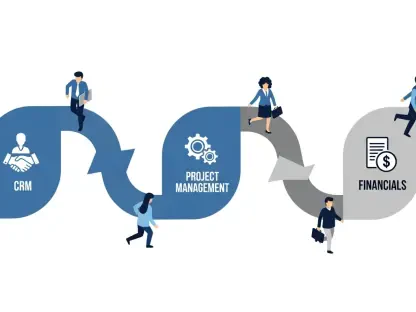Introduction to Enterprise AI and Microsoft’s Latest Innovation
Imagine a world where businesses can seamlessly orchestrate complex AI systems to handle intricate tasks with minimal human intervention, slashing operational costs by double-digit percentages, and driving efficiency across industries. This scenario is rapidly becoming reality as enterprise AI transforms digital landscapes, fostering innovation in various sectors. The adoption of AI technologies has surged, with companies increasingly relying on intelligent systems to optimize workflows, enhance decision-making, and personalize customer experiences. This shift underscores the critical role of AI in modern business operations, positioning it as a cornerstone of digital transformation strategies.
Enterprise AI encompasses several pivotal segments, including AI agent development, multi-agent systems, and production-grade solutions tailored for large-scale deployment. These areas are fueled by advancements in large language models (LLMs) and managed services that simplify the integration of AI into existing infrastructures. Key players like Microsoft, OpenAI, and Azure dominate the competitive landscape, each vying to set benchmarks through innovative offerings. Their rivalry fosters rapid progress, pushing the boundaries of what AI can achieve in corporate settings.
A significant factor shaping this industry is the rise of open-source tools and a focus on interoperability. These elements are vital for establishing standards that ensure systems can communicate and function cohesively across platforms. Microsoft’s latest contribution to this dynamic field—a newly unveiled framework—promises to redefine how enterprises build and manage AI agents, aligning with these broader trends and setting a new precedent for scalable, accessible solutions.
Exploring the Microsoft Agent Framework
Core Features and Capabilities
The newly introduced Microsoft Agent Framework stands out as a comprehensive open-source software development kit and runtime, designed to streamline the creation and management of AI agents for enterprise applications. It integrates essential components from AutoGen’s multi-agent patterns, which facilitate collaborative AI interactions, and Semantic Kernel’s enterprise controls, ensuring robust governance and plugin architecture. This fusion creates a unified platform that addresses the nuanced demands of production environments.
Key functionalities of the framework include a unified runtime for seamless operation, state management for consistent performance, and telemetry for detailed monitoring. Additionally, it offers dual orchestration modes—agent orchestration for LLM-driven creative planning and workflow orchestration for deterministic business logic. These features provide flexibility to cater to a wide range of use cases, from innovative problem-solving to structured operational tasks.
A notable aspect of this framework is its emphasis on pro-code development, targeting complex enterprise applications that require intricate coding expertise. This approach ensures that developers have the tools needed to build sophisticated systems capable of handling intricate challenges, positioning the framework as a go-to solution for organizations with advanced AI ambitions.
Market Positioning and Strategic Importance
In the crowded enterprise AI market, the Microsoft Agent Framework carves out a leadership position for Microsoft by addressing critical needs in agent development. Its design aligns with industry trends toward interoperable systems and managed runtimes, reducing dependency on specific vendors and fostering broader compatibility. This strategic alignment enhances Microsoft’s reputation as a pioneer in delivering tools that meet evolving enterprise demands.
The framework’s open-source availability under the MIT license further amplifies its market impact, encouraging widespread adoption and community-driven innovation. By providing accessible SDKs for Python and .NET, Microsoft ensures that developers across various technical backgrounds can leverage the framework, democratizing access to cutting-edge AI capabilities.
Looking ahead, the framework holds significant potential to accelerate AI deployment within enterprises. Its forward-thinking design suggests a trajectory of growth, where it could become a foundational element in shaping how businesses integrate AI solutions, driving both efficiency and creativity in operational models.
Challenges in Enterprise AI Agent Development
The journey to effective enterprise AI agent development is fraught with technical hurdles that can impede progress. Issues such as token throughput limitations, latency in processing, and the need for robust failure recovery mechanisms often challenge developers striving to maintain system reliability. These obstacles can disrupt the seamless functioning of AI systems, necessitating innovative approaches to mitigate their impact.
Beyond technical barriers, market-driven challenges also pose significant concerns. The high cost of developing custom “glue code” to integrate disparate systems often burdens budgets, while the inherent fragility of such solutions risks operational breakdowns. These economic and structural issues highlight the need for streamlined tools that minimize custom coding and enhance system resilience.
The Microsoft Agent Framework offers promising solutions to these challenges by reducing the reliance on custom code through standardized interfaces and providing enhanced telemetry for diagnostics. Additionally, managed services like Azure AI Foundry address scalability and operational complexities, enabling enterprises to deploy AI agents in production environments with greater confidence and efficiency.
Regulatory and Governance Considerations in Enterprise AI
Navigating the regulatory landscape is a critical aspect of deploying enterprise AI systems, as data privacy laws and content safety standards continue to tighten globally. Compliance with regulations such as GDPR and similar frameworks is non-negotiable for businesses aiming to avoid penalties and maintain trust. These legal requirements shape how AI technologies are developed and implemented, demanding rigorous oversight.
The Microsoft Agent Framework incorporates compliance features to meet these demands, including identity enforcement and safety filters facilitated through Azure AI Foundry. Such mechanisms ensure that AI operations adhere to ethical guidelines and protect sensitive data, aligning with the industry’s push for responsible technology use. This focus on built-in safeguards provides a layer of assurance for enterprises operating in regulated sectors.
Governance plays an equally vital role in securing AI deployments, emphasizing observability and policy enforcement. Microsoft’s commitment to these principles reflects best practices, ensuring that the framework supports ethical AI use while meeting regulatory expectations. This balance between innovation and accountability is essential for fostering sustainable growth in enterprise AI applications.
Future Outlook for Enterprise AI Systems
Emerging trends in multi-agent systems signal a growing appetite for interoperable and scalable AI solutions that can adapt to diverse business needs. As companies seek to integrate multiple agents into cohesive workflows, the demand for frameworks that support such complexity is expected to rise sharply over the coming years. This shift points to a broader evolution in how AI systems are conceptualized and deployed.
Potential disruptors, such as advancements in LLM technology and a pivot toward open-source platforms among developers, could reshape the enterprise AI landscape. These changes may drive competition and innovation, pushing providers to offer more flexible, cost-effective tools. Additionally, consumer and enterprise needs for reliable systems are likely to influence the direction of future developments, prioritizing efficiency and accessibility.
Global economic conditions and evolving regulatory frameworks will also impact the adoption of AI frameworks. As businesses navigate these external factors, deeper integration with observability tools and expanded support for various model providers are anticipated growth areas. These enhancements could further solidify the role of solutions like Microsoft’s in meeting the dynamic requirements of enterprise AI ecosystems.
Conclusion and Strategic Recommendations
Reflecting on the insights gathered, the unveiling of the Microsoft Agent Framework marks a pivotal moment in unifying AI agent development and tackling persistent production challenges. Its role as a versatile and interoperable solution stands out as a game-changer for enterprises seeking to harness AI at scale. The framework’s ability to streamline complex processes while addressing economic concerns cements its value in a competitive market.
Moving forward, businesses are encouraged to adopt this framework for scalable AI initiatives, leveraging its managed runtime capabilities to boost operational efficiency. Exploring partnerships and community collaboration offers a pathway to further refine and expand its applications. Investing in training for developers to fully utilize its pro-code features emerges as a practical step to maximize returns.
Ultimately, Microsoft’s contribution to the AI ecosystem sparks optimism for continued advancements. Focusing on tighter integration with governance tools and broadening model compatibility hints at untapped potential, paving the way for transformative impacts in how enterprises approach AI-driven innovation.









